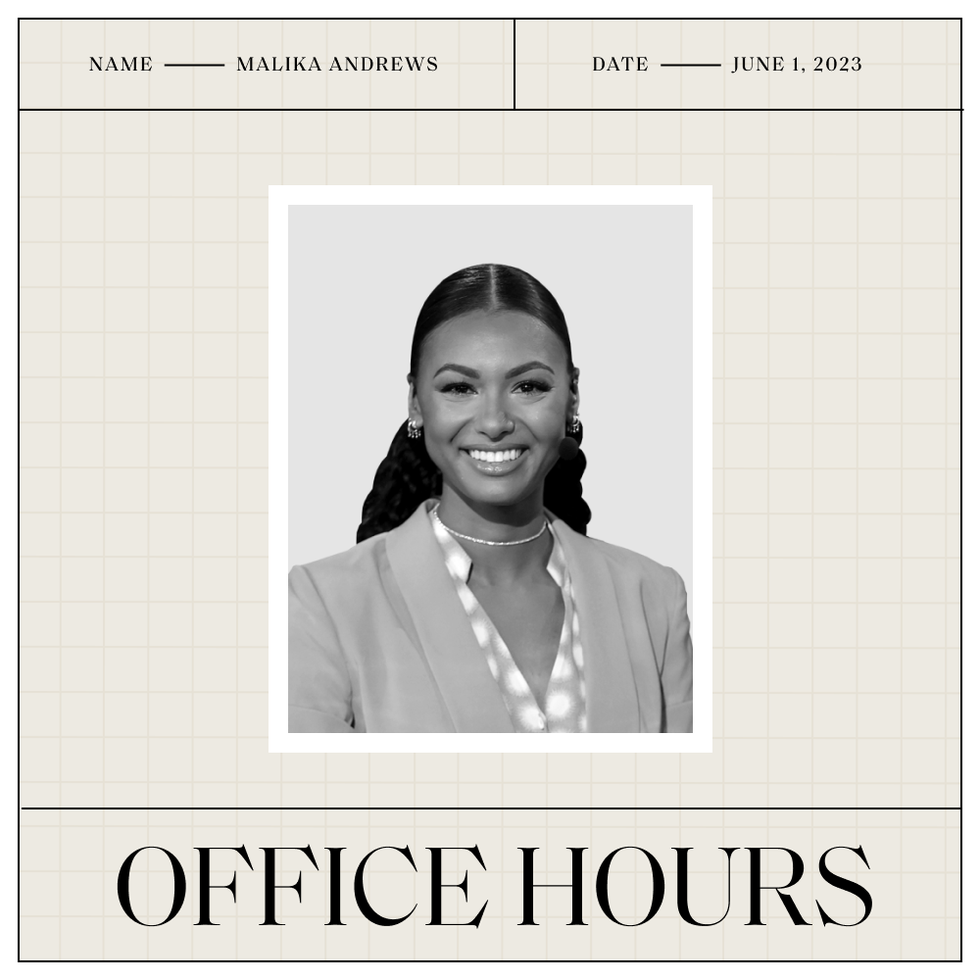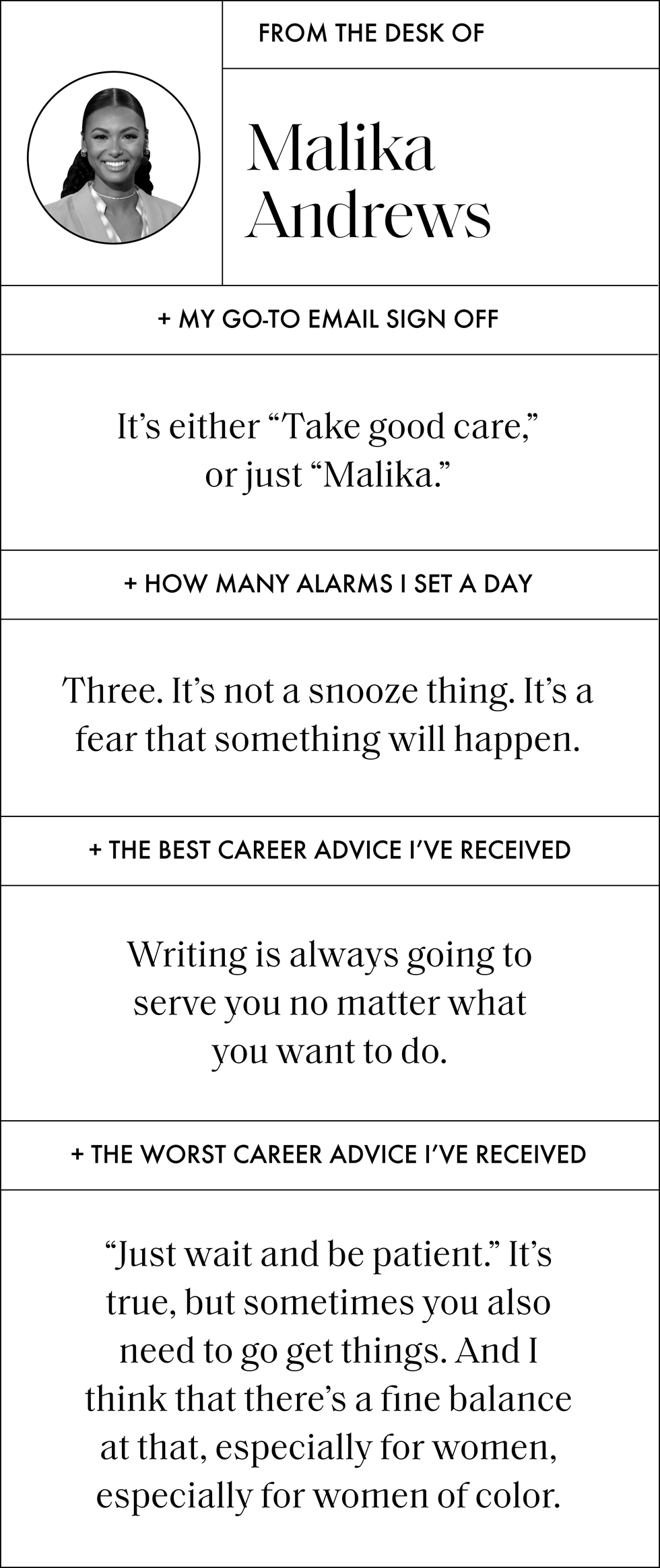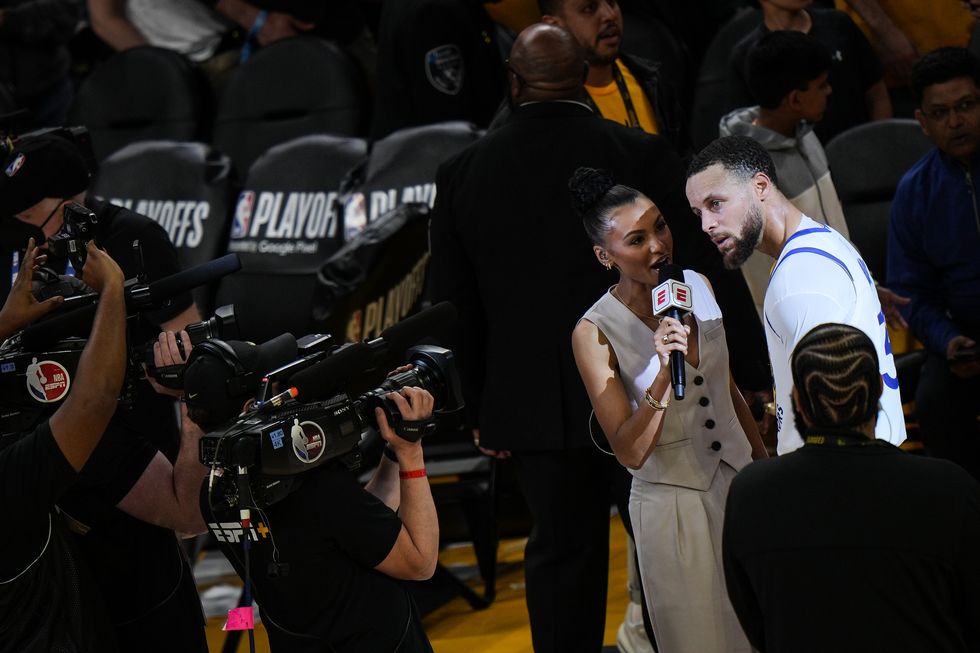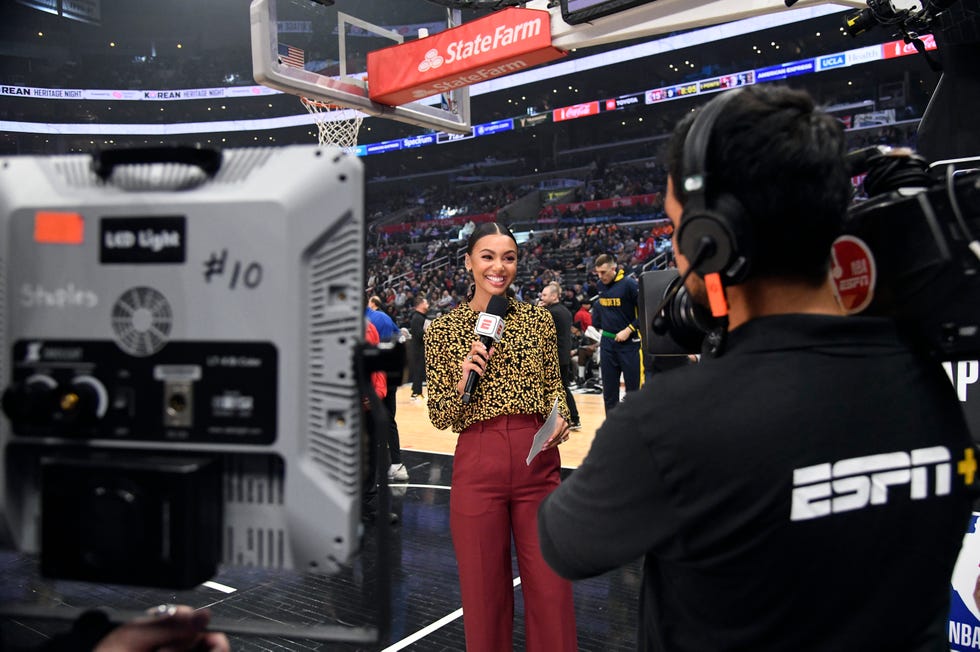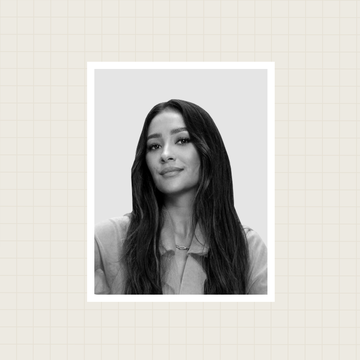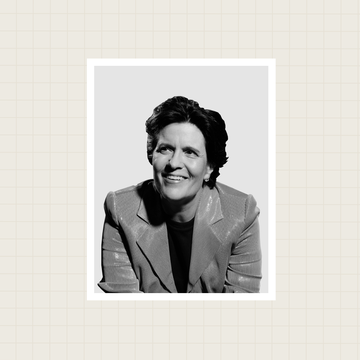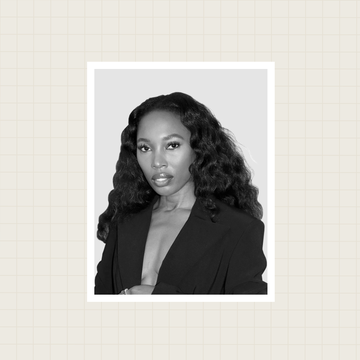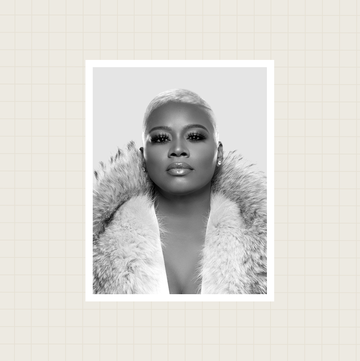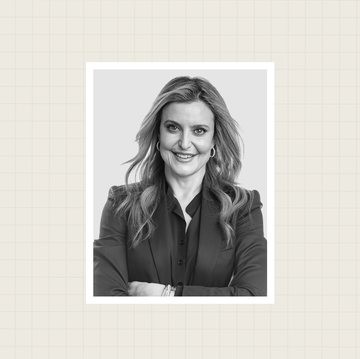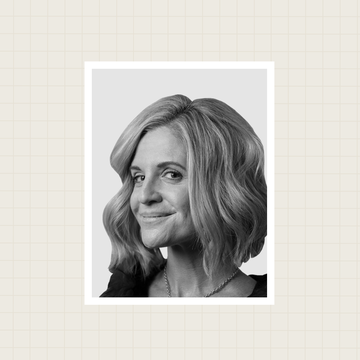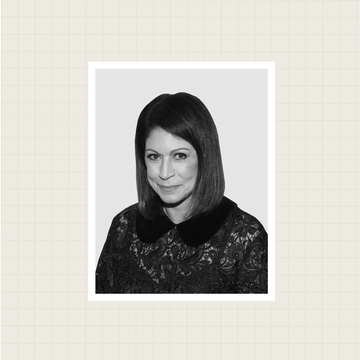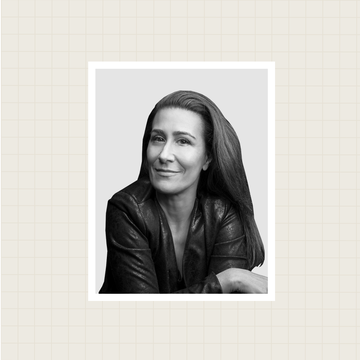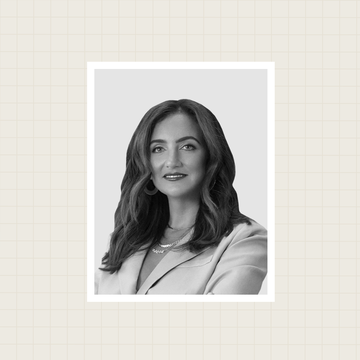In ELLE.com’s monthly series Office Hours, we ask people in powerful positions to take us through their first jobs, worst jobs, and everything in between. This month we spoke to Malika Andrews, sports journalist and host of ESPN’s NBA Today. If you’re a basketball fan, you might’ve seen Andrews hosting her weekday show, reporting from the sidelines (especially in “the bubble” during strict COVID restrictions), or on SportsCenter in the past few years. Before turning 30, she’s already hit some major milestones: During the 2019-2020 season, she became one of the youngest sideline reporters ever to cover a Conference Finals telecast, and last year, she became the first woman to host the NBA Draft. The Oakland native was a fellow at the sports desk at The New York Times and a reporter for the Chicago Tribune before landing at ESPN in 2018. Since then, she’s sat down with stars from Steph Curry to Giannis Antetokounmpo. She’s also covered major cultural news like Britney Griner’s arrest and return to the U.S. and NCAA champ Angel Reese rising above her critics.
When Andrews gets on the phone, she’s in a car in Los Angeles, about to fly to Chicago, where she’ll be covering the NBA Draft and filming segments for her show before returning to L.A. to cover the Western Conference finals. Her schedule is nonstop and “less than predictable,” especially during playoff season. But that’s just how she likes it. “This is definitely the craziest time of year, but it’s also the most fun,” she says. As the NBA Finals begin tonight, Andrews walks us through her come-up, her mentors, and working with her sister.
My first job
I was a hostess at IHOP.
My worst job
Probably that. Or, I cleaned horse poop out of stalls for a summer. That was not great.
When I realized I didn’t want a desk job
I worked at my grandfather’s law firm as a secretary when I was younger, and it was fascinating, and the work that he does as a civil rights attorney was so awesome and so cool. But I worked with him and I looked around and I was like, “I just don’t think a desk job is for me.” I like the excitement of never knowing exactly where you’re going to be or what you’re going to do. That sort of spontaneity, I think, is fun and exciting.
On my love for writing and basketball
I don’t know which came first, but they came very separately, if that makes sense. I’ve always loved basketball. I loved watching games with my family. My dad is a personal trainer, and so it was like, play sports, do sports, soak in sports, and so I’ve always loved that.
And then I’ve always loved to write, but they were always separate. Writing was my favorite subject in school; reading was my favorite thing to do. My mom and I used to tout who could read more books in the summer outside of our school books. And then [basketball and writing] merged in college. I knew I was bad at math, I lean way too heavily on calculators. I literally chose my major based on which I had to take the fewest math classes for. So how can I marry these two things? And that’s when they came together.
On whether I always wanted to be on TV
I had no idea. Honestly, working at The New York Times was my dream job, and that’s what I did right out of school. I was really lucky. I had never had a really hard “no” in my career at that point. I had soft “no”s, and “not yet”s, said “maybe later”s, but when The New York Times told me that I wasn’t ready to stay there, that was the first really hard “no” that I heard in my career and it stuck with me. I went to this place of, am I ever going to recover from this? Am I ever going to bounce back? What are people going to think of me, that I’m not good enough for the one thing that I have always wanted and always dreamed of doing? And I left the Times and went to the Chicago Tribune. It wasn’t until ESPN, actually, that TV was even remotely in the picture, because writing was my first love. And even when they asked me do TV, I was like, “Are you sure? I’m not so sure about this.”
My first basketball game
I was six weeks old. It was the Charlotte Hornets versus the Golden State Warriors, and that was my first basketball game. Actually Dell Curry, Steph Curry’s dad, was on that Charlotte Hornets team.
I don’t remember this, but I feel like it’s been told so many times. It was the ‘90s, it was before they had the earmuffs that babies wear now, so my dad would put his hands over my ears because every time the announcer would scream, I’d put my hands up in the air and look like, ahhh, what is this? So he kept his hands over my ears the entire game.
My most memorable interview so far
There’s no feeling like the trophy ceremony that I was lucky enough to be entrusted with in 2021. Even looking at the video and pictures later, you’re just swallowed. You’re this teeny little dot of a person that is swallowed into this massive celebratory feat. It’s the pinnacle of sport and it’s this thrill of knowing that literally millions of people are listening to the way that these athletes, who have hoped and dreamed of something their entire life and achieved the one goal that they’ve been working towards, and you were sort of the facilitator of that moment. I don’t think that there’s anything like it.
I remember how nervous I was. I remember I took this deep breath and wondered, maybe, did I want one more game just to be a little bit more prepared? Then when it became so clear the Milwaukee Bucks were going to win that game and Giannis was having this historical 50-point performance in a closeout game, there’s was no going back.
I take so much pride now in doing a daily show. I’ve done interviews with many MVPs and finals MVPs, and serious interviews around COVID, and around the various issues that have popped up as society and the league intertwined, but when I just think of, close your eyes and think of a feeling, I’ve never got that feeling doing anything else. And it was the coolest thing I’ve ever been a part of.
On covering Britney Griner’s arrest and return home
At first it was unimaginable. You’re talking about a person. You’re covering a person with a family, with loved ones, with teammates who has, in essence, become a political pawn. And to cover it full circle from... I remember when we first started talking about it and going to our reporter, TJ Quinn, to get us the information on what was happening, and we heard, “I don’t know” so often. “I don’t know exactly where she is.” “I don’t know why she is.” There were so many things that were unknown. And in a profession where information is king and currency, that was the scariest part. So then when that gave way to this clarity of a dire situation where the biggest unknown was when and if she would ever be coming home, coming back to the United States, you feel this immense responsibility.
We were the place that people were coming to find out what was happening to this woman and what could happen to her moving forward. On the day that she was released, we were the first show on our ESPN-ABC Family Networks to air footage of her actually on the plane. To see that and sit next to Becky Hammon and Chiney Ogwumike, who know her so personally, it was one of those moments where you think back and it’s like, oh yes, this is right. This is why I do this.
What I do when things don’t as planned on live TV
Oftentimes it’s minor things, right? Sometimes something serious happens on air and you have to pivot. But I think that’s the thing about things like today where it’s, “Oh, we’re going to air and we had a plan for our B block of a show,” and then it’s like, “Oh, LeBron James is going to speak. Can you ad-lib an introduction to this?” There is nothing that gives me that feeling other than when there’s notes in your hand, there’s something in the teleprompter, and then the teleprompter shuts off and you put down your notes and it’s like, just go. And it’s when those are the moments and I’m like, this is what’s exciting, this is what’s fun. That’s when I can tell my producers, “I got this.” This is what I’m good at. This is what I love.
Whether it’s, “this player got hurt: go,” “this player’s been traded: go,” “this coach has been fired, go”... This is driving a race car. This is when you just step on it and go and it tests you and it’s the work that you get the most proud of.
On being the first woman to host the NBA draft
I felt immense responsibility. I was there because other people had opened that door for me. I was not there just because I had done a solid job in a situation here or a situation there. I was there because of years, decades, of hard work. Those “no”s that I was talking about, how I’d never been told “no?” Holy shit. Can you imagine the number of “no”s that women in sports have been told and given and beat over the head with before me? The NBA Draft has been televised since the 1980s.
It wasn’t just me: the lead producer, Linda Schultz, who oversees all of it; the producer who was in my ear and right behind me, Hilary Guy; the three-shot at the beginning with myself, Chiney Ogwumike, and Monica McNutt. To embody that progress is a privilege, and it’s not something that I, or any of the women that I worked with on that broadcast, took lightly.
I think that we still have a lot of work to do. There’s, I think, somewhat of a misconception that it’s now easy and over with, and that’s not the case. And what a weird time: I hosted the draft, we celebrated the 50th anniversary of Title IX that same day, and then the next day, Roe v. Wade started to be stripped down. So it’s a step forward, a step back, a step forward, 10 steps back. It was one of those things where you look around and you say, “Yes we can, and yes we did.” And then the next day is, “And this is what we still have to do.”
My female mentors in a male-dominated industry
I’m lucky that the list is endless. And I’m even luckier that I get to literally work with them. How cool is it that I get to work with Doris Burke, and Cassidy Hubbarth, and Lisa Salters, and Ramona Shelburne, and Robin Roberts, and Hannah Storm? The fact that I can pick up the phone and call these women and be like, “This happened today, what would you do?” And they’re like, “Well, that happened to me two years ago and I did this and I did that.” That is an awesome reality.
On working with my sister
Kendra and I were always close, we grew up close, but to know all the characters, we speak the same language because there’s no backstory in explaining who this person or that person is. There’s just this inherent knowledge; it’s pretty awesome. She’s the best even if she steals my watch.
This interview has been edited and condensed.
Erica Gonzales is the Senior Culture Editor at ELLE.com, where she oversees coverage on TV, movies, music, books, and more. She was previously an editor at HarpersBAZAAR.com. There is a 75 percent chance she's listening to Lorde right now.
